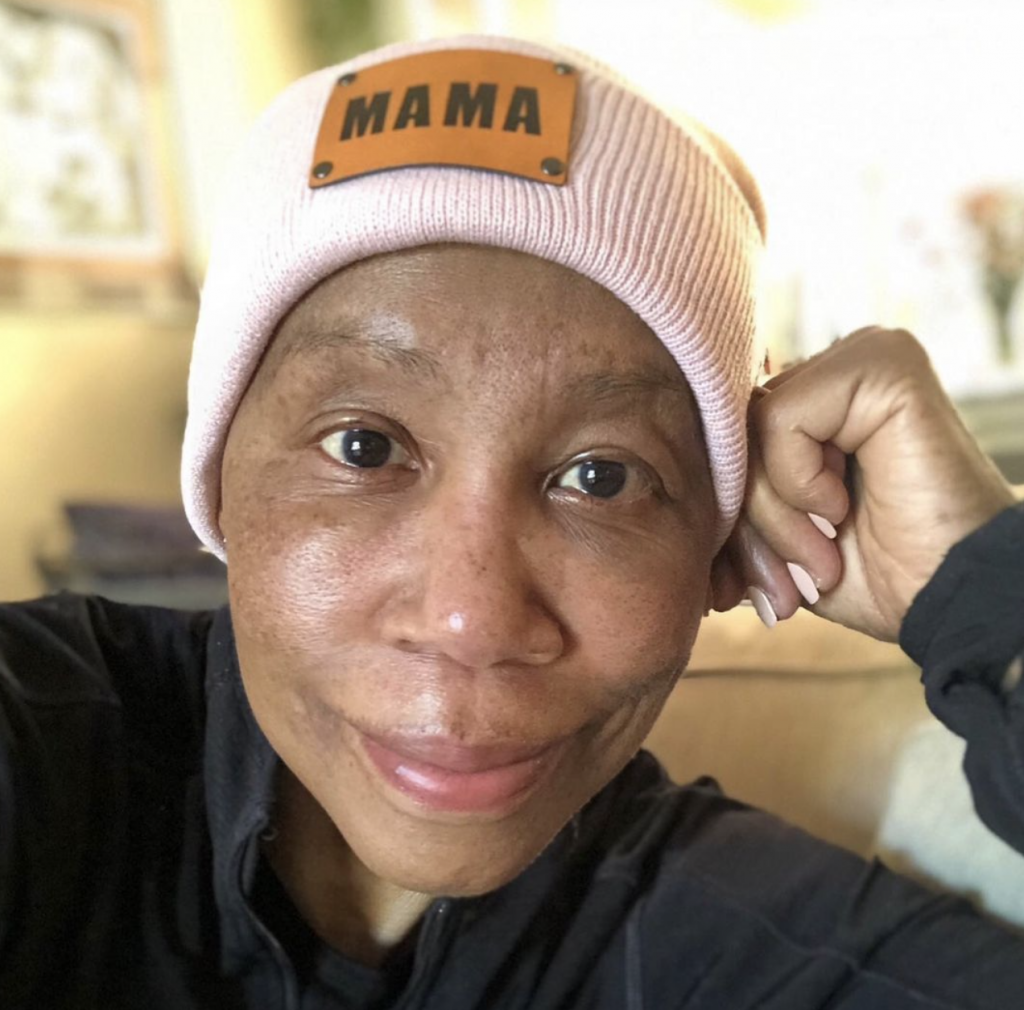Sharing Her Health News
- Veteran news anchor Trisha Goddard, 66, is revealing more about her private struggles while living with metastatic breast cancer, since initially she said she did not want to be the “poster girl” for the disease, and instead, chose to hide her pain and symptoms.
- The CNN correspondent was first diagnosed with breast cancer in 2008. She then became disease-free. But a little over two years ago, she learned that her cancer had returned to her bones, specifically her right hip, which made the diagnosis metastatic, or stage 4, an incurable but manageable cancer, thanks to advancements in treatment. Eventually, she could no longer handle keeping her health news to herself.
- After a cancer diagnosis, many are open to sharing their experiences as much as they can, while others prefer to keep it to themselves or close loved ones. SurvivorNet experts say both approaches, and everything in between, are valid.
“It’s not who I am, it’s what I’m living with,” the Good Morning Britain star and CNN correspondent said Thursday in an interview with HELLO!.
Read More
Getting more serious, Goddard shared her thoughts about how people living with chronic should be treated, and she wants to avoid the typical cancer-related titles people are so used to hearing. “I think we do them a disservice when we use words like ‘brave,’ ‘champion,’ ‘hero,’ ‘survivor,’ because they just want to grasp the life they have.”
“And I don’t want everything to be, ‘Oh, you look so good,’ in brackets ‘considering you have cancer,'” she added.
Trisha Goddard’s Diagnosis
Goddard was first diagnosed with breast cancer in 2008. She then became disease-free.
But a little over two years ago, she learned that her cancer had returned, unfortunately to her bones, specifically, her right hip, which made the diagnosis metastatic, or stage 4, an incurable but manageable cancer, thanks to advancements in treatment.
“It’s not going to go away,” she explained in Thursday’s interview. “And with that knowledge comes grief and fear. But I must keep enjoying what I have always enjoyed.”
The decision to finally share her diagnosis partly happened to free her from holding all of that information inside — because it was getting to be too much. “I can’t lie; I can’t keep making up stories. It gets to a stage, after a year and a half, when keeping a secret becomes more of a burden than anything else.”
“I’m nervous,” she added. “But it needed to be done.”
Back in March, Goddard shared a post on Mother’s Day in the UK, starting a conversation about the reality of living with cancer.
“We don’t ‘battle’ ‘fight’ ‘win’ or ‘lose’ anything when it comes to Cancer. We’re not ‘brave’ or ‘warriors’ – We just try’na do our normal day-to-day stuff. We take our Meds. We turn up for Treatment.”
“We get anxious and scared when people see us as our illness and not as ourselves,” Goddard added, continuing:

“Mama-style we feel guilty for not being as present for our families as we wish we could be. So to all Mamas living with any chronic illness, hang on in there. Try not to be protective to the point of shutting your babies out. (Been there done that – Now know better!). And today, let them pamper the bloody hell outta you!🤣.”
Managing Chemotherapy Side Effects
Chemotherapy is an effective tool for oncologists to help treat or manage cancer by stopping cancerous cells from growing, dividing, and spreading to other organs. Chemo works by traveling through the bloodstream, killing cancerous cells. However, healthy cells are also impacted in the process, leading to side effects.
Patients almost universally experience fatigue, often alongside gastrointestinal side effects, such as nausea. Doctors have many effective medications to combat chemo-induced nausea. “But mitigating that fatigue often depends on the patient,” Dr. Renata Urban, a gynecologic oncologist at the University of Washington in Seattle, previously told SurvivorNet.
Learning more about chemotherapy treatment
“Neuropathy is probably one of the most challenging side effects,” explains, Dr. Renata Urban, a gynecologic oncologist at the University of Washington in Seattle. Neuropathy results from damage to the peripheral nerves. It usually resolves after chemotherapy treatment, but sometimes symptoms can persist.
While it’s typically characterized by numbness or a pins-and-needles sensation in the hands and feet, neuropathy can have several different symptoms, including:
- Weakness in the hands or feet
- Stabbing or burning pain in the hands or feet
- Difficulty gripping, such as when holding a fork
- Difficulty with fine motor skills, such as writing or buttoning a shirt
- Nausea and vomiting are common side effects of chemotherapy. When chemotherapy affects the rapidly dividing cells in the lining of the stomach, the resulting cellular havoc in the gastrointestinal tract can lead to side effects such as nausea and vomiting. However, doctors can help patients mitigate the hit with various medications before, during, and after treatment.
“Part of the chemotherapy prescription includes a set regimen of anti-nausea medications,” Dr. Urban explained. “We also ensure that patients have medications at home that they can use should they develop nausea after treatment.”
Hair Loss
Hair loss is another side effect of chemotherapy. It usually begins about three to four weeks after chemotherapy and continues throughout treatment. It happens because this treatment targets quickly dividing cells throughout the body.
WATCH: Coping with hair loss
“For cancer patients, losing one’s hair can be unbelievably stressful. To start with, the dread of losing one’s hair can lead to some sleepless nights and feelings of anxiety,” Dr. Samantha Boardman, a New York-based psychiatrist and author, told SurvivorNet.
Most patients can expect regrowth four to six weeks after treatment. However, it is possible when your hair grows back, you may notice some changes in its color and texture.
To Share or Not to Share a Cancer Diagnosis
After a cancer diagnosis, many are open to sharing their experiences as much as they can, while others prefer to keep it to themselves or close loved ones. SurvivorNet experts say both approaches, and everything in between, are valid.
“Patients who have just been diagnosed with cancer sometimes wonder how they are going to handle the diagnosis of the cancer in social situations,” psychiatrist Dr. Lori Plutchik previously explained to SurvivorNet.
Questions like, “How much information should I share and with whom should I share the information?” are things Plutchik says patients will often wonder. “There is no one right way to handle this diagnosis. People should do what feels right to them.”
WATCH: What to know about sharing your diagnosis?
A cancer journey can last from just a few months to years to a lifetime, which means patients may be experiencing a lot of uncertainty until they fully understand where their health stands. This uncertainty can influence when someone is ready to share their diagnosis, Dr. Plutchik noted.
Dr. Plutchik also stressed that those close to a person going through cancer should be respectful of their wishes when it comes to disclosing their diagnosis and seeking support.
Many Parents Find Strength in Their Children During Cancer Battles
Hoy referenced his young children for sharing his diagnosis. Sometimes, children offer parent patients moral support while battling cancer directly or indirectly. We often hear parents say things like, “I’m going to beat this for my children.”
Facing cancer as a parent can be incredibly daunting. Fearful thoughts about leaving your children may creep into your mind and add even more to your overflowing plate.
“No matter what your prognosis is, it’s essential to talk openly and honestly with kids,” said Laura Nathan-Garner, Director of Strategic Communications at MD Anderson Cancer Center.
RELATED: Telling Your Kids You Have Cancer: ‘When it Comes to Your Kids, You Want to Protect Them’
“Cancer patients with children can have increased motivation to endure difficult treatment but may also be concerned about the emotional impact of the illness on their offspring,” Dr. Cindy Moore of Massachusetts General Hospital Cancer Center explained to The ASCO Post, an oncology newspaper.
Dr. Moore said those with children should discuss their most significant concerns with their healthcare teams so an effective communication plan can be created.
Learn more about SurvivorNet's rigorous medical review process.

